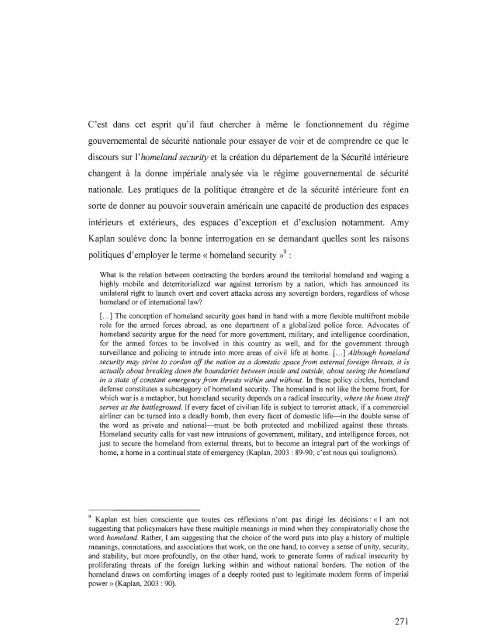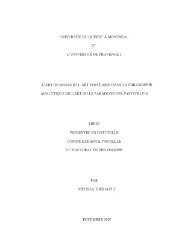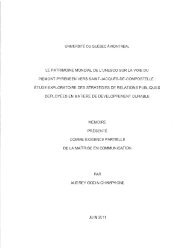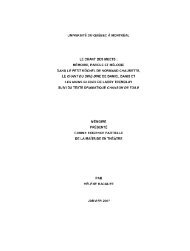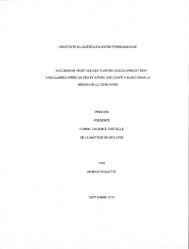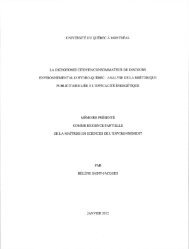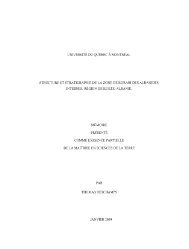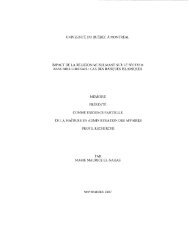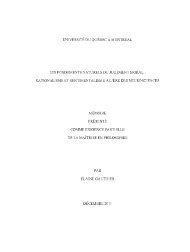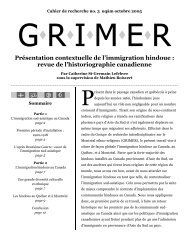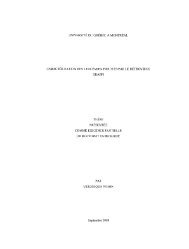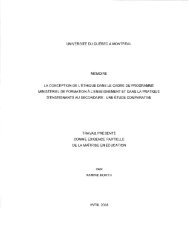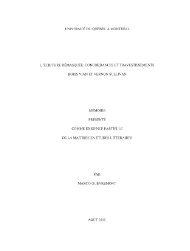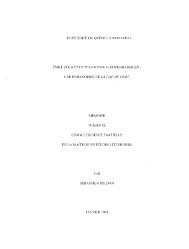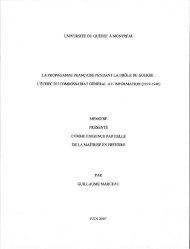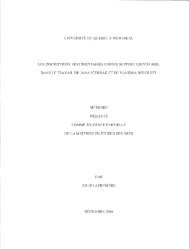- Page 1 and 2:
UNIVERSITÉ DU QUÉBEC À MONTRÉAL
- Page 3 and 4:
REMERCIEMENTS L'écriture de cette
- Page 5 and 6:
Katia Gagné, Sébastien Bmthe, Jea
- Page 7 and 8:
AVANT-PROPOS L'écriture d'une thè
- Page 9 and 10:
viii 5.1.2 La généalogie 53 5.2 L
- Page 11 and 12:
1.3 La Guerre contre la terreur com
- Page 13 and 14:
2. Le Nomos de la TelTe dans la Gue
- Page 15 and 16:
LISTE DES ACRONYMES ET DES ABBRÉVI
- Page 17 and 18:
INTRODUCTION La sécurité national
- Page 19 and 20:
de la stratégie militaire, c'est-
- Page 21 and 22:
2001 sur le choix d'une nouvelle do
- Page 23 and 24:
l'Espace et la préparation à la g
- Page 25 and 26:
centraux du Defense Planning Guidan
- Page 27 and 28:
Weldes, 1999). Les détenteurs du p
- Page 29 and 30:
la « défense» à la « sécurit
- Page 31:
l'emploi de régime gouvernemental
- Page 34 and 35:
au lendemain de la Seconde Guerre m
- Page 36 and 37:
institutionnelle: elle est dans les
- Page 38 and 39:
sur la théorisation du processus d
- Page 40 and 41:
Si le concept de «géopolitique»
- Page 42:
« intellectuels de la défense »2
- Page 45 and 46:
and Others, in terms of cartographi
- Page 47 and 48:
dites comme étant intérieures alo
- Page 49 and 50:
civilization, the fear of cultural
- Page 51 and 52:
de façon accélérée le processus
- Page 53:
libérale sécuritaire; c'est « a
- Page 56 and 57:
affronter l'exception: Réflexions
- Page 58 and 59:
global libéral américain établi
- Page 60 and 61:
interaction dialectique: elle le pr
- Page 62 and 63:
4.7 Une géopolitique critique de l
- Page 64 and 65:
facie plausibility compared to othe
- Page 66:
compétiteur stratégique. La même
- Page 69 and 70:
eader's interpretation of a text is
- Page 71 and 72:
productions de think tanks, des dis
- Page 73 and 74:
Presses universitaires de l'armée
- Page 75 and 76:
einforce or contest each other» (H
- Page 77 and 78:
problématique principale où les
- Page 79 and 80:
froide comme «nouvelle frontière
- Page 81 and 82:
CHAPITRE 1 LE MOMENT SCHMITTIEN AM
- Page 83 and 84:
en marge des approches traditionnel
- Page 85 and 86:
l'objectif de faire tomber les barr
- Page 88 and 89:
d'Alexander Wendt, surtout quand à
- Page 90 and 91:
threatens to make International Rel
- Page 92 and 93:
poststructural approaches need to b
- Page 94 and 95:
of the world and asks how that orde
- Page 96 and 97:
Cela implique, en outre, de repense
- Page 98 and 99:
Pour Michel Foucault, 1'« episteme
- Page 100 and 101:
Wohlforth 17, pour ne nommer que ce
- Page 102 and 103:
ne doivent être employées qu'en d
- Page 104 and 105:
national security state that was sh
- Page 106 and 107:
les critiques intérieures contre l
- Page 108 and 109:
aison de la perforrnativité du lan
- Page 111 and 112:
praticiens politiques autant que de
- Page 113 and 114:
chercheurs œuvrant dans des think
- Page 115 and 116:
spatiale américaine. Cela nous emp
- Page 117 and 118:
Les attaques terroristes sur le sol
- Page 119 and 120:
usait de la force pour conquérir u
- Page 121 and 122:
forger des opinions dans des émiss
- Page 123 and 124:
mams de ceux qui les désignent com
- Page 125 and 126:
The militarization of inner space t
- Page 127 and 128:
détention sous le couvert de la s
- Page 129 and 130:
de la vIe politique américaine (Sh
- Page 131 and 132:
Dire et écrire la sécurité n'est
- Page 133 and 134:
partie de la géostratégie dans la
- Page 135 and 136:
liberté, de la démocratie et de l
- Page 137 and 138:
les dirigeants dans celle-ci en rap
- Page 139 and 140:
1. L'Amérique comme lieu - et comm
- Page 141 and 142:
américains se succèdent et change
- Page 143 and 144:
puritain Jolm Winthrop en 1630, dep
- Page 145 and 146:
eprésente le mythe fondateur par e
- Page 147 and 148:
de recherche et de croire que ce de
- Page 149 and 150:
difference who occupies the White H
- Page 151 and 152:
néoconservateur - lequel emploie v
- Page 154 and 155:
confronter l'enjeu de l'hégémonie
- Page 156:
États-Unis comme étant dès le d
- Page 159 and 160:
oundaries to be re-enacted, challen
- Page 161 and 162:
partiellement suspendus, entretenir
- Page 163 and 164:
« régénératives» pOill « l'Hu
- Page 165 and 166:
sans détour d'un « exceptionnalis
- Page 167 and 168:
sur les États-Unis et sur l'univer
- Page 169 and 170:
2002). En fait, au sortir du second
- Page 171 and 172:
tension between liberalism's emphas
- Page 173 and 174:
America is the world - or, at least
- Page 175 and 176:
acisme, le colonialisme et l'empire
- Page 177 and 178:
transformation fondamentale de l'É
- Page 179 and 180:
CHAPITRE 3 LE DÉVELOPPEMENT POLITI
- Page 181 and 182:
en 1945, les États-Unis n'étaient
- Page 183 and 184:
1. Les États-Unis comme national s
- Page 185 and 186:
socioéconomique et politique aux
- Page 187 and 188:
pénétrer le tissu social pour fai
- Page 189 and 190:
qu'il donne à la militarisation 6
- Page 191 and 192:
davantage l'expérience de la guerr
- Page 193 and 194:
nouveau national security state est
- Page 195 and 196:
américaine durant la Deuxième Gue
- Page 197 and 198:
logique de l'État de sécurité na
- Page 199 and 200:
s'implanter au sem du régime gouve
- Page 201:
sécuritaires américains ont été
- Page 205 and 206:
en charge l'activité sécuritaire
- Page 207 and 208:
observateurs comme un « renouveau
- Page 209 and 210:
CHAPITRE 4 LA LUTTE GLOBALE CONTRE
- Page 211 and 212:
américaine? Si nous répondons san
- Page 213 and 214:
chapitre ne s'intéresse pas tant a
- Page 215 and 216:
1.1 La Guerre contre la terreur et
- Page 217 and 218:
mentionné Stoler, c'est là aussI
- Page 220 and 221:
Dans le Nomos de la terre, on en re
- Page 222 and 223:
La justice de la guerre, lorsqu'ell
- Page 224 and 225:
seraient « au mieux de naïfs quas
- Page 226 and 227:
du néoconservatisme, Irving Kristo
- Page 228 and 229:
« néoconservateurs »étaient sou
- Page 230 and 231:
conjoncturelle et constitue un mome
- Page 232 and 233:
d'ailleurs vue à travers le prisme
- Page 234 and 235:
Richard Hofstadter lorsqu'il écrit
- Page 236 and 237: cependant qu'ils sont les porteurs
- Page 238 and 239: signifie « progressiste» qu'on op
- Page 240 and 241: vision étriquée du progressisme d
- Page 242 and 243: S'il est donc vrai que la tension e
- Page 245 and 246: sécurité sociale et a voulu disci
- Page 247 and 248: Le communisme, plus que la perversi
- Page 249 and 250: Dans le cadre du régime gouverneme
- Page 251 and 252: l'American Enterprise Institute et
- Page 253 and 254: militaro-industriel. Lorsqu'on rega
- Page 255 and 256: is something we pursue rather than
- Page 257 and 258: , cet appui allait perdurer. De plu
- Page 259 and 260: 4.1 Quand guerre contre le terroris
- Page 261 and 262: Roosevelt implored Americans to loo
- Page 264: clairement inspirées des documents
- Page 267: 4.3 De la critique de l'empire néo
- Page 270 and 271: 5. Conclusion Le présent chapitre
- Page 272 and 273: de l'image des États-Unis comme la
- Page 274 and 275: CHAPITRE 5 LES NOUVELLES FRONTIÈRE
- Page 276 and 277: comme outil discursif permettant d'
- Page 278 and 279: communisme soviétique, le régime
- Page 280 and 281: est traditionnellement vu comme un
- Page 282 and 283: cependant pas que le « spectre du
- Page 284 and 285: 2.3 La domopolitique de la sécurit
- Page 288 and 289: 3. La production stratégique amér
- Page 290 and 291: l'avènement d'une stratégie de la
- Page 292 and 293: diverses menaces et agressions diri
- Page 295 and 296: 3.2 La production stratégique de s
- Page 297 and 298: considéré comme la première lign
- Page 299 and 300: pour créer les conditions d'une vi
- Page 301 and 302: 4.1 The Pentagon's New Map et la no
- Page 304 and 305: On peut certes constater, dans sa c
- Page 306 and 307: stratégiques 1 8. Pour lui, « l'o
- Page 308 and 309: economy enhances our national secur
- Page 310 and 311: agir selon leur bon vouloir, car il
- Page 312 and 313: des élites de sécurité nationale
- Page 314 and 315: uilding) et que la supériorité te
- Page 316 and 317: leurs dirigeants et stratèges en v
- Page 318 and 319: un précieux outil discursif pour m
- Page 320 and 321: sécurité nationale américain au
- Page 322 and 323: CHAPITRE 6 GÉNÉALOGIE DE LA PUISS
- Page 324 and 325: ce faire, nous retraçons les Oligi
- Page 326 and 327: Monica en Californie, où était ba
- Page 328 and 329: satellites. Fortunately, RAND's fir
- Page 330 and 331: think tanks ont donc le pouvoir de
- Page 332: jusqu'à son abrogation en 2002 doi
- Page 335 and 336: suivant la conception schmittienne
- Page 337 and 338:
C'est lors du passage futur présid
- Page 339:
géostratégie, à travers l'espoir
- Page 342 and 343:
etrouve des postulats similaires qu
- Page 344 and 345:
de la même façon que l'amiral Mah
- Page 346 and 347:
antagonistic conflict would disappe
- Page 349 and 350:
l'avènement de systèmes de défen
- Page 351 and 352:
4. Critique de la stratégie astrop
- Page 353 and 354:
la Russie et la Chine, mais si on e
- Page 355 and 356:
Space superiority must be developed
- Page 357 and 358:
prendra cette voie si cela s'avère
- Page 359 and 360:
concerne la question de la guerre s
- Page 361 and 362:
1. Vers la guerre spatiale L'Espace
- Page 363 and 364:
militairement pour le futur mais de
- Page 365:
peuvent venir de partout et frapper
- Page 368 and 369:
could be imagined to take"» (Richa
- Page 370 and 371:
question. Ce qui est particulièrem
- Page 373 and 374:
Il semble toutefois que la simulati
- Page 375 and 376:
towner vers Carl Schmitt apparaît
- Page 377 and 378:
Mendieta, 2006 : 220). En effet, Sc
- Page 379 and 380:
que Paul Virilio a nommé l'« inve
- Page 381 and 382:
Il est crucial de comprendre commen
- Page 383 and 384:
projet identitaire américain dès
- Page 385 and 386:
Avec la Guerre contre la teneur, ce
- Page 388 and 389:
Guerre contre la terreur, nous reje
- Page 390 and 391:
autre entité. Ce sont les États-U
- Page 392 and 393:
elievers of everyone. The new imper
- Page 395 and 396:
Schmitt, « La guerre est une lutte
- Page 397 and 398:
*** En sachant que la voie pour un
- Page 399 and 400:
d'une résistance au discours domin
- Page 401 and 402:
Ainsi que le rappelle l'historien d
- Page 403 and 404:
Le cas le plus probant de la prése
- Page 405 and 406:
Dieu ("play Gad') (Nye 2003 : 6). C
- Page 407 and 408:
militaire, là où ils ont plusieur
- Page 409 and 410:
éventuellement. Cette position nie
- Page 411 and 412:
(Rasmussen, 2007: 195-196). Dans ce
- Page 413 and 414:
guerre froide, par l'instauration d
- Page 415 and 416:
ASAT capabilities, especially for d
- Page 417 and 418:
interprétation du soi-disant éche
- Page 419 and 420:
technocratique, telle que la socié
- Page 421 and 422:
où elle « affirme, au nom du prog
- Page 423 and 424:
critique normative que nous avons m
- Page 425 and 426:
dire que si on n'a pas encore vu la
- Page 427 and 428:
7.2 L'interprétation stratégique
- Page 430 and 431:
Robert Kagan que bien que la condui
- Page 432 and 433:
2002 : 109). Ainsi donc, contrairem
- Page 434 and 435:
Des volontés de développer un cod
- Page 436:
Unis sont en position de force pour
- Page 439 and 440:
Ce qui compte est de montrer commen
- Page 441 and 442:
9. Conclusion Si l'Espace a été v
- Page 443 and 444:
l'Espace et la guerre spatiale ne s
- Page 445:
CONCLUSION L'état de guerre perman
- Page 448 and 449:
terreur en nous intéressant partic
- Page 450 and 451:
sécurité nationale as a way oflif
- Page 452 and 453:
langage sécuritaire employé par l
- Page 454 and 455:
du débat stratégique américain s
- Page 456 and 457:
transformation ne pouvait trouver d
- Page 458 and 459:
tactiques rhétoriques de l'adminis
- Page 460 and 461:
astropolitique américaine. Dans no
- Page 462 and 463:
healthy skepticism must be exercise
- Page 464 and 465:
émancipatoire, on n'échappe pas a
- Page 466 and 467:
Meale, Alan (rapporteur, Royawne-Un
- Page 469 and 470:
Huntley, Wade L. 2005. «Where No B
- Page 471 and 472:
Sources secondaires Abdulhadi, Raba
- Page 473 and 474:
Ambrosius, Lloyd E. 2006. « Woodro
- Page 476 and 477:
Beeson, Mark et Richard Higgott. 20
- Page 478 and 479:
Bishai, Linda S. 2004. «Liberal Em
- Page 480 and 481:
Bromley, Simon. 2003. « Reflection
- Page 482 and 483:
Ceyhan, Ayse. 2001. « La fin de l'
- Page 484 and 485:
Cox, Robert W. 2001. « The Way Ahe
- Page 486 and 487:
DeboreJ, Guy. 1992 [1967]. La soci
- Page 488 and 489:
Domosh, Mona 2004. « Selling Civil
- Page 490 and 491:
Engelhardt, Tom. 1995. The End ofVi
- Page 492 and 493:
Foucault, Michel. 1978b [2001]. «
- Page 494 and 495:
Go, Julian. 2004. « "Racism" and C
- Page 497 and 498:
Halliday, Fred. 2000. «Culture and
- Page 499 and 500:
Hoefle, Scott W. 2004. « Bitter Ha
- Page 501 and 502:
Huysman, Jef. 1998. «Dire et écri
- Page 503 and 504:
Johnson, Chalmers, Herbert Docena e
- Page 505 and 506:
Kerber, Linda K. 2005. « Toward a
- Page 507 and 508:
Kristol, William et Robert Kagan. 1
- Page 509 and 510:
Political Scientists, and the Study
- Page 511 and 512:
Macleod, Alex, et Catherine Voyer-L
- Page 513 and 514:
McPherson, Alan. 2006. « Americani
- Page 515 and 516:
Moynihan, Donald P. et Alasdair Rob
- Page 517 and 518:
Nye, Joseph S. 2002-2003. « Limits
- Page 519 and 520:
0sterud, 0yvind. 1996. « Antinomie
- Page 521 and 522:
Peterson, V. Spike et Anne Sisson R
- Page 523 and 524:
Rasmussen, Mikkel Vedby. 2006.]he R
- Page 525 and 526:
Russell Mead, Walter. 2002. Special
- Page 527 and 528:
Sharp, Joanne P. 1998. «Reel Geogr
- Page 529 and 530:
Smith, Steve. 1999. «The Increasin
- Page 531 and 532:
Stoett, Peter. 1999. Human and Glob
- Page 533 and 534:
Virilio, Paul. 1976. Essai sur l'in
- Page 535 and 536:
Waltz, Kenneth N. 1979. Theory ofIn
- Page 537 and 538:
William Wallace. 1996. «Truth and


